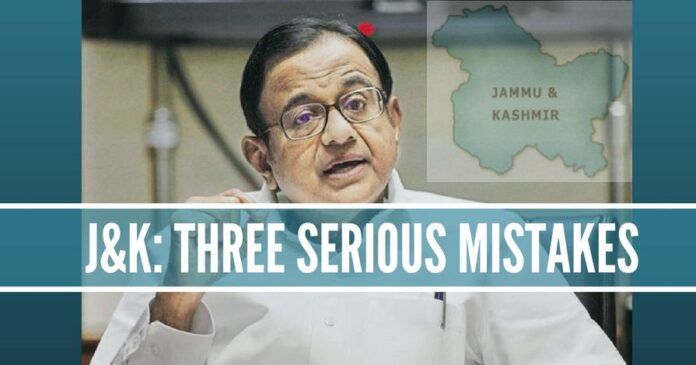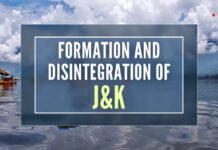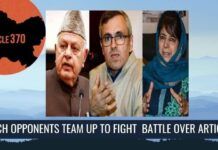
P Chidambaram equating Article 370 with Articles 371 to Article 371(I) constituted just one of the three serious mistakes which he committed in his political essay
Congress leader and former Union Home Minister P Chidambaram’s latest essay on Jammu and Kashmir “Across the aisle: India is failing the test on J-K” (Indian Express, May 13) must not be ignored. This, notwithstanding the fact that he has on umpteen occasions made his stand on the border State of Jammu and Kashmir crystal clear: He stands for pre-1953 politico-constitutional status for the state that restricts the jurisdiction of New Delhi over Jammu and Kashmir to just three subjects – Defence, Foreign Affairs and Communications – and leaves the rest to the care of the Muslim leadership in Kashmir. He is also a bitter critic of Armed Forces Special Powers Act under which the armed forces involved in anti-insurgency operations in Jammu and Kashmir enjoy legal immunity and he wants Chief Minister Mehbooba Mufti to snap all her ties with Prime Minister Narendra Modi’s Government on the ground its Kashmir policy is aggressive.
Thirumani was not killed by “thoroughly misguided young men”; he was lynched by dreaded stone-pelters.
What Chidambaram said in Srinagar as Home Minister on October 15, 2009 also is too fresh to be forgotten. He had, inter-alia, said: “Kashmir has a unique geographical location and a unique history. We have to find a solution that may turn out to be unique. The whole effort would be quiet until the contours of a political solution to the problem are found. This is essential to take the process forward. Once the broad contours of a political solution are arrived at, it will be made public at an appropriate time” (Indian Express, Oct 16, 2009). He made this statement while addressing the All India Editors’ Conference on Social and Infrastructure issues.
What did P Chidambaram say about Jammu and Kashmir and the political status it should enjoy in his “India is failing the test on J-K”? “Article 370 (Oct 19, 1949) was a historical compact between the Union of India (read Indian Dominion as India became Union only on January 26, 1950) and the ruler (Maharaja Hari Singh) of the princely State of Jammu and Kashmir. It is not the only special provision concerning a state. There are other provisions such as Article 371 to Article 371(I),” he said, among other things.
P Chidambaram, who is also a top lawyer, not only exposed himself by describing Article 370 a “compact” between the Government of India and Maharaja Hari Singh, but he also exposed his intellectual bankruptcy by equating Article 370 with Article 371.
(Article 370 was incorporated as Article 306-A in the under-preparation Indian Constitution as a “Temporary Provision” on October 19, 1949, two years after the accession of Jammu and Kashmir to the Indian Dominion on October 26, 1947. And, the Instrument of Accession signed by Maharaja Hari Singh was similar to the one signed by other 560-odd princely states. There was no difference whatsoever, as this document had been prepared by the State Department (Home Ministry) of the Government of India.)
There is no comparison between the Article 370 and the Article 371. The Article 371, unlike Article 370, doesn’t empower any of the states to enjoy a special status within the Union and exercise residuary powers. Nor does it empower any of the states to have a separate constitution and a separate flag.
Article 371 simply empowers the President of India to set up separate development boards for Vidarbha and Marathawada (Maharashtra) and Saurashtra and Kutch (Gujarat). The Article 371-A protects the “religious or social practices of the Nagas” and their “customary laws” and empowers the Nagaland Assembly to adopt or not to adopt the Central laws concerning “ownership and transfer of land and its resources”. It also gives “special responsibility” to the Governor of Nagaland “with respect to law and order in the State of Nagaland”.
Article 371-B provides for the Constitution and functions of a committee of the legislative assembly of the state (of Assam) consisting of members of that assembly elected from the tribal areas and for a similar committee in respect of Manipur comprising members of the assembly elected from the areas of the state.
Article 371-C requires the Governor to write a report to the President regarding the administration of the areas of Manipur. Article 371-D empowers the President of India to provide for equitable opportunities and facilities for the people belonging to different parts of the state (of Andhra Pradesh).
Article 371-E empowers the Parliament to establish a university in Andhra Pradesh.
Article 371-F authorises the Parliament to protect the rights and interests of different sections of the population in Sikkim by creating or earmarking certain Assembly seats for candidates belonging to such sections. It also states the Governor of Sikkim shall have special responsibility for peace and for an equitable arrangement for ensuring the social and economic advancement of different sections of the population of Sikkim.
Article 371-G states no Act of Parliament in respect of religious or social practices of the Mizos, Mizo customary laws and practices, administration of civil and criminal justice involving decisions according to Mizo customary laws and ownership and transfer of land shall apply to Mizoram unless the legislative assembly of the state by a resolution so decides…”
Article 371-H gives special responsibility to the Governor with respect to law and order in the state of Arunachal Pradesh and in the discharge of his functions in relation thereto, the “Governor shall, after consulting the council of ministers, exercises his individual judgment as to the action to be taken…”
Article 371-I states “notwithstanding anything in this (Indian) Constitution, the legislative assembly of the state shall consist of not less than thirty members”.
Thus, Article 371, unlike Article 370, is beneficial for the ignored sections of society and ignored and underdeveloped regions. It empowers the Governors in certain states to exercise special powers and responsibilities and act according to their individual judgment. In fact, Article 370 divides the society and promotes fissiparous tendencies and Article 371 unites and empowers the people.
P Chidambaram equating Article 370 with Articles 371 to Article 371(I) constituted just one of the three serious mistakes which he committed in his political essay. Two others were: (1) Rajavel Thirumani, 22, of Chennai, was “killed by a stone pelted by thoroughly misguided young men” and (2) “all the political parties in Jammu and Kashmir unanimously resolved (on May 9 at Srinagar) to call upon the Central Government to announce a unilateral ceasefire”.
Thirumani was not killed by “thoroughly misguided young men”; he was lynched by dreaded stone-pelters. What did an Indian Express report in this regard say: It said: “The left side of his face was completely smashed; his jaw, teeth and nose were broken. There was a huge pool of blood under him”. To say that the lynching of Thirumani was the handiwork of misguided Kashmiri young men would be only to rub salt on the wound of the bleeding nation and accord a dangerous respectability to the cult of stone-pelting. The truth is that the attack on Thirumani and other tourists from Kerala and two judges from Karnataka in a short span of 7 days was a part of a deep-rooted conspiracy hatched to tell the Indians that Kashmir was a no-entry zone for them.
Indeed, Chidambaram views on Articles 370 and 371, cold-blooded murder of Thirumani and a unilateral ceasefire are as shocking as they are ridiculous
P Chidambaram says all the political parties in Jammu and Kashmir unanimously resolved to call upon the Central Government to announce a unilateral ceasefire. He was factually wrong. Just one Kashmir-based MLA, Engineer Rashid, who is known more for his anti-India rants and rabble-rousing than anything else, raked the issue of a unilateral ceasefire during the over 4-hour-long all-party meeting held in Srinagar under the leadership of Chief Minister Mehbooba Mufti and there was no discussion at all on the unilateral ceasefire suggestion.
The BJP as a party and BJP leader and newly-appointed Deputy Chief Minister Kavinder Gupta called the Chief Minister’s bluff in less than 24 hours. The BJP held a press conference to clear the air and declared in unambiguous terms that there was no discussion on the issue and that the BJP was opposed to the very suggestion as it was fraught with dangerous ramifications.
“The BJP does not endorse the idea of a unilateral ceasefire – a suggestion that did not come under discussion during the all-party meeting. It was not put to consensus. The Army has maintained pressure on the militants and now is the time to strengthen the hands of the Army. This is not the stage or time for a unilateral ceasefire,” Sunil Sethi, BJP chief spokesperson said at Jammu to clear the party’s stand (The Tribune, May 11).
As for Deputy Chief Minister Kavinder Gupta, he the same day said: “Some participants had suggested a ceasefire during the all-party meeting on Wednesday, but there was no consensus. The militants will have to take the initiative. We want the ceasefire to last forever, not just the month of Ramzan,” Kavinder Gupta also said (Indian Express, May 11).
Not only the BJP as a party and Deputy Chief Minister Kavinder Gupta set the record straight, but the main opposition National Conference and the CPI-M also exposed the Chief Minister and said “there was no consensus over the ceasefire appeal before the Chief Minister Mehbooba Mufti announced it to the press”. National Conference lawmaker Choudhary Ramzan and CMI-M lone MLA from Kashmir’s Kulgam Mohammad Yousuf Tarigami rejected the Chief Minister’s claim. And what the spokesperson of Jammu and Kashmir Government, senior PDP leader and minister in the Mehbooba Mufti Government Naeem Akhtar said was just amazing and laughable. Akhtar said: “The idea was ‘raised’ during the meeting…Besides, the Chief Minister has the right to channelise the feelings of the people” (Greater Kashmir, May 12).
It bears recalling that addressing a press conference after the all-party meeting, Mehbooba Mufti had claimed that it was agreed that there should be a unilateral ceasefire during the month of Ramazan and Amarnath Yatra. “Everyone agreed that we must appeal Centre that government must think about a unilateral ceasefire like Vajpayee Ji did in 2000. Encounters and crackdowns are causing trouble to common man. Efforts must be made to maintain environment so that Eid and Amarnath Yatra are peaceful,” she had said (Indian Express, May 10).
All this should set the record straight and establish that P Chidambaram’s approach towards Kashmir is not in the larger national interest. Indeed, his views on Articles 370 and 371, cold-blooded murder of Thirumani and a unilateral ceasefire are as shocking as they are ridiculous and amazing.
Note:
1. The views expressed here are those of the author and do not necessarily represent or reflect the views of PGurus.
- ‘Kashmir My core constituency’: Revisiting July 12, 2003 to understand politics, Omar Abdullah-style - March 15, 2024
- Total deviation from traditional approach: Seven takeaways from PM Modi’s March 7 Srinagar visit - March 9, 2024
- Status of political parties: Why is further J&K reorganization imperative? - March 1, 2024











Chidambaram is a pseudo intellectual and his views must be treated with disdain. When he was FM the country’s finances were not safe and when he was HM our people were not safe. He has a crooked and a corrupt mind and these characters must be thrown into the gutters!!!
Congi demons are the scums of a civilised society